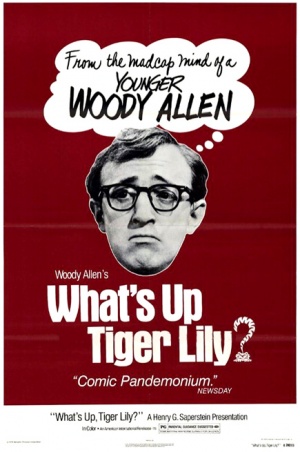
WHAT'S UP TIGER LILY?
US, 1966, 80 minutes, Colour.
Original Japanese film directed by Senkichi Taniguchi;
American dubbed version directed by Woody Allen.
What’s Up, Tiger Lily is a comic gimmick. Many countries have done the same with old sword-and-sandal films, substituting their own dialogue for the images on screen. This can be seen in the Australian film of 1994, David Parker’s Hercules Returns.
However, in the mid-1960s, before any of his other feature films, Woody Allen took a Japanese action film, International Secret Police: Key of Keys and redubbed it. The action plot was changed to make it focus on a secret egg salad recipe. Obviously, this kind of humour is hit-and-miss. However, it is interesting as something in Woody Allen’s career, his wit and humour.
The film is amusing in itself – but is probably more of an acquired taste and a lesson in Woody Allen comedy rather than an entertainment.
1. How enjoyable a film, the quality of the idea for comedy and spoof, the contribution to Woody Allen's type of comedy?
2. The title and audience response? The opening and the Japanese film and its sense of the ridiculous and adventure? The importance of Woody Allen's explanation? The importance of Woody Allen's personality his introducing himself, the middle of the film, his reappearance at the end?
3. Audience response to Allen's sense of humour: the deadpan of the humour, the playing with words, the irony of the words and the situations, the sense of the incongruous, the parody of the adventures style, the insight into the ridiculous side of human nature, humour in the foibles of human nature, the humour of gentle mockery? How were these best illustrated?
4. Audience response to the Japanese film itself and its exaggeration of the spy and adventure genre? Its use of hero and heroines, conventional situations of danger and sexuality? Audience response to the quality of the visuals? What was the original film really like?
5. The contribution of the episodes involving the group The Lovin' Spoonful? Did they add to the film or not?
6. Comment on the impact of the parody on James Bond in the middle of the sixties. The impact now? The presentation of the hero and the mocking of him, the mock heroic adventures? The status of women? The presentation of the villains? Insight into the conventions about these characters?
7. The humour with the map, the sense of place, Japan and the Middle East?
8. How humorous was the choosing of an egg salad recipe for the spoof on the Secret Service and espionage?
9. Comment on the details of the dialogue and the type of humour that the audience was responding to?
10. What light did the film throw on the art of film making, the nature of editing, the nature of dubbing, audience response to visuals and audience dependence on words to give the significance of the visuals?
11. How clever a film? The use of film for parodying human nature for teasing and spoofing the audience and its expectations?